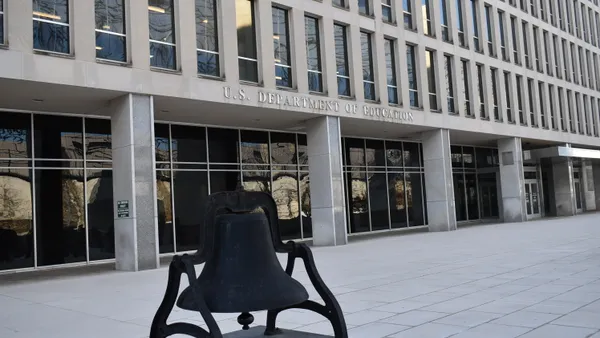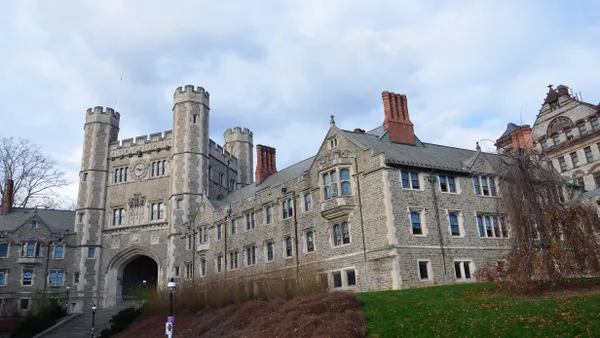Dive Brief:
- The Middle States Commission on Higher Education (MSCHE) announced Monday that it will accept applications for accreditation from institutions located outside its historical territory, which is primarily the mid-Atlantic states.
- It will also begin taking applications from international institutions seeking accreditation.
- MSCHE is the second of the country's seven historically regional accreditors to make such a move, the result of new federal regulations removing their geographic boundaries.
Dive Insight:
MSCHE follows the WASC Senior College and University Commission (WSCUC) in actively seeking to accredit institutions beyond its historical bounds. WSCUC made the move earlier this year, though it planned to start in a more limited fashion than MSCHE by focusing on schools it already works with.
Martin Kurzweil, director of the Educational Transformation Program at consultancy Ithaka S+R, expects other regional accreditors to follow in fairly short order.
The decision intends to help MSCHE grow its footprint and accredit a wider range of institutions, said its president, Heather Perfetti, who took over the position earlier this month after serving as president-elect, senior vice president and chief of staff.
Expanding internationally is also a focus. MSCHE will lift its moratorium on international applications starting on Jan. 1 and will take a phased approach to adding schools, starting where it already has institutions, Perfetti said. The accreditor already oversees "a small number" of international colleges, in part stemming from a pilot of international accreditation in the early 2000s, according to its website.
MSCHE's decision comes as the pandemic is expected to accelerate consolidation in higher education, and as fewer international students come to the U.S. for college.
As such, regional accreditors will need to "think outside the box" to find new ways to maintain their recognition by the higher ed market as the most important accreditors in the U.S., said Deborah Seymour, a higher ed consultant.
Being one of the first regional accreditors to welcome institutions outside of their historical domain is one way to do that, she said.
But critics of the U.S. Department of Education's new regulations, which went into effect on July 1, say the decision to end regional accreditation could prompt colleges to seek out accreditors with lower standards.
Kurzweil, who echoed that concern, points out another factor that could spur colleges to switch accreditors: red tape. Regional accreditors, now able to compete for the same schools, could try to gain an advantage over their peers by reducing the administrative burden while maintaining a rigorous review. "In a way, it's kind of competing on price," he said, noting that any change in institutional accreditation is likely to be slow.
Regional accreditors, which typically focus on entire institutions, could also compete with each other by accrediting specialty programs, Seymour said. That would put them in competition with specialized commissions as well as national accreditors.
The pathway to accreditation for international institutions has also become "much more open," Seymour said. Kurzweil noted that international institutions might see accreditation from U.S. commissions as a "seal of approval" that attract students, and help transfer degrees or credits from their institution to an American one.
Expansion also offers accreditors a way to shore up their finances. The consolidation environment in higher ed doesn't only risk shrinking accreditors' membership. Furloughs and layoffs also dry up the supply of reviewers, Seymour said.
And technical support and training services related to program improvement that some accreditors have developed could be marketed to a wider set of institutions, according to Kurzweil.
Perfetti wrote in an announcement of the decision that MSCHE would "consider alternative sources of financial support for the increasingly complex work of accreditation," including pursuing grant-funded projects.
She told Education Dive that the commission has been having more interactions with its members and acknowledges that an institution may need MSCHE's consideration at a different time than its regular review cycle allows. MSCHE will be looking at whether there may be a different model to support this, she said.
WSCUC, for its part, has not yet added institutions outside of its historic region, but discussions about doing so "are at varying stages with several institutions," WSCUC President Jamienne Studley wrote in an email to Education Dive.














